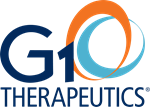- On-Target Effect of Trilaciclib Reduces Rates of Multiple Adverse Events Associated with Sacituzumab Govitecan-Hziy by Over 50% Including Neutropenia, Anemia, and Diarrhea -
- Most Enrolled Patients Received Prior PD-(L)1 Inhibitor Treatment; Initial Objective Response Rate (ORR) in Overall Study Population Consistent with ORR in Checkpoint Inhibitor Pretreated Population in ASCENT Trial -
- Initial ORR Higher in Patients with PD-L1(+) Tumors Relative to Overall Study Population, Consistent with Expectation Based on the Ability of Trilaciclib to Enhance Anti-Tumor Immunity -
- Overall Survival (OS) Results are Currently Expected in the First Quarter of 2024 -
RESEARCH TRIANGLE PARK, N.C., May 10, 2023 (GLOBE NEWSWIRE) -- G1 Therapeutics, Inc. (Nasdaq: GTHX), a commercial-stage oncology company, today presented preliminary results from 30 patients enrolled in its ongoing Phase 2, single arm study of trilaciclib administered prior to the antibody-drug conjugate (ADC), sacituzumab govitecan-hziy in patients with unresectable locally advanced or metastatic triple-negative breast cancer (TNBC). These data highlight the potential for trilaciclib to meaningfully reduce adverse events related to use of sacituzumab. As expected, patients with PD-L1(+) tumors appear to respond earlier than patients with PD-L1(-) tumors. The Company expects to reach the overall survival (OS) endpoints in the first quarter of 2024.
Data generated across multiple preclinical and clinical studies to date show that trilaciclib has the greatest effect on longer term endpoints including OS rather than earlier efficacy measures such as ORR and progression free survival (PFS), consistent with other immunotherapies like checkpoint inhibitors. These results suggest that this is likely due to trilaciclib’s immune-mediated mechanism of action that protects the immune system from the initial damage caused by ADC therapy and enhances long term immune surveillance by increasing the generation of certain memory T cells. This dual benefit may provide important longer-term benefits for patients by improving their ability to generate robust immune responses, particularly when treated with future subsequent therapies.
“These preliminary results continue to show the consistent benefit of trilaciclib when administered prior to sacituzumab, relative to the previously published single agent safety profile of this ADC, including greater than 50 percent reductions in the incidence of events including neutropenia, anemia, and diarrhea,” said Raj Malik, M.D., Chief Medical Officer at G1 Therapeutics. “It is too early to determine the efficacy of trilaciclib prior to sacituzumab in this patient population. However, early indications suggest a higher response rate in patients with PD-L1 positive tumors, which commonly have an immune inflamed tumor microenvironment and are thus more likely to respond early to immunotherapies. Given that this trial includes a heavily pretreated patient population, we are enthusiastic about these data to date. We will continue to monitor efficacy to assess the potential of trilaciclib to improve overall survival - by protecting the immune system and stimulating long term immune surveillance - when combined with additional treatment regimens beyond gemcitabine/carboplatin for patients with TNBC. We look forward to these overall survival data in the first quarter of 2024.”
These results are being presented at the European Society for Medical Oncology (ESMO) Breast Cancer 2023 Annual Congress. The poster, titled, “Trilaciclib Combined with Sacituzumab Govitecan (SG) In Metastatic Triple-Negative Breast Cancer (mTNBC): Preliminary Phase 2 Results,” can be found here.
Patient Demographics
As of the data cut date of April 3, 2023, all patients (N = 30) had received at least one dose of any study drug and 93.3% of patients had metastatic disease. Patients received a median (range) of 5.5 (1-20) cycles of treatment, and median follow-up was 5.5 months. Eleven (11) patients remain on study treatment and 22 patients remain in the study. In addition, a majority (73.3%; 22/30) of enrolled patients had received prior PD-(L)1 immunotherapy and 63.3% of patients had PD-L1(+) tumors.
Safety Data (n=30)
Trilaciclib was well tolerated when administered prior to sacituzumab. Safety results showed a clinically meaningful on-target effect of trilaciclib to reduce (>50%) the rates of multiple adverse events compared to the previously published sacituzumab govitecan-hziy single agent safety profile from the ASCENT trial, including myelosuppression (neutropenia, anemia) and diarrhea due to the presence of CDK4/6-expressing cells in the intestinal crypt.
| Summary of Treatment Related Adverse Events (TRAE) in patients receiving trilaciclib in combination with sacituzumab govitecan-hziy | Summary of TRAEs in patients receiving sacituzumab govitecan-hziy1 (Includes TEAEs with a ≥ 10% increase with sacituzumab vs. chemotherapy) | |||||||||
| Phase 2 trial of trilaciclib in combination with sacituzumab: TRAEs (n=30) | ASCENT (no trilaciclib): TRAEs (n=258) | |||||||||
| Adverse Event | Any Grade | Grade 3-4 | Adverse Event | Any Grade | Grade 3-4 | |||||
| Neutropenia | 30% | 13% | Neutropenia | 63% | 51% | |||||
| Diarrhea | 27% | 3% | Diarrhea | 59% | 10% | |||||
| Nausea | 30% | 3% | Nausea | 57% | 3% | |||||
| Alopecia | 33% | 0% | Alopecia | 46% | 0% | |||||
| Fatigue | 47% | 0% | Fatigue | 45% | 3% | |||||
| Anemia | 10% | 0% | Anemia | 34% | 8% | |||||
| Vomiting | 17% | 3% | Vomiting | 29% | 1% | |||||
1Adapted from Bardia A, et al. Sacituzumab Govitecan in Metastatic Triple-Negative Breast Cancer. N Engl J Med 2021;384:1529-41. DOI: 10.1056/NEJMoa2028485. Table 3
Treatment-related adverse events (TRAE) of any grade related to any study drug were reported in 76.7% of patients, the most common of which were fatigue, alopecia, nausea, and diarrhea. Adverse events (AEs) leading to treatment discontinuation of study drug occurred in one patient.
Initial Efficacy Results
With a median follow-up of 5.5 months, the efficacy of trilaciclib prior to sacituzumab in this patient population is preliminary. Initial results to date show that ORR is higher in patients with PD-L1(+) mTNBC (confirmed ORR=35.3%) relative to the overall study population (confirmed ORR=25.0%). To date, one additional patient has experienced an unconfirmed response. The median Progression Free Survival (mPFS) with trilaciclib plus sacituzumab was 4.1 months. The Company expects to reach the OS endpoints in the first quarter of 2024.
This study includes a heavily pretreated patient population, with 73.3% of patients having received prior PD-(L)1 treatment and 26.7% of patients having >3 anticancer regimens. Prior data from the ASCENT trial have shown a 34.9% ORR in the overall study population, and that patients pretreated with PD-(L)1 therapy show lower initial responses to sacituzumab (28.4% in pretreated patients vs. 37.5% in untreated patients) and a lower mPFS vs the overall population (4.2 months pretreated patients vs. 5.6 months in untreated patients) (Bardia A, et al. Figures S5 and 2).
One patient in G1’s trial to date achieved a partial response (59% reduction in the sum of longest diameters; SLD) after initial progressive disease (21% increase in SLD) with continuation of therapy at the investigator’s discretion, as the patient seemed to be deriving clinical benefit with trilaciclib and sacituzumab. This patient was not included in the confirmed response calculation. This type of improvement after continued therapy post-progressive disease has been observed with immunotherapies like checkpoint inhibitors but is not usually associated with cytotoxic therapies alone, further suggesting the potential immunotherapeutic benefit of trilaciclib.
About Triple Negative Breast Cancer (TNBC)
According to the American Cancer Society, nearly 300,000 new cases of invasive breast cancer are diagnosed annually in the U.S. Triple-negative breast cancer makes up approximately 15-20% of such diagnosed breast cancers. TNBC is cancer that tests negative for estrogen receptors, progesterone receptors, and excess HER2 protein. Because mTNBC cells lack key growth-signaling receptors, patients do not respond well to medications that block estrogen, progesterone, or HER2 receptors. Instead, treating mTNBC typically involves chemotherapy, radiation, and surgery. TNBC is considered to be more aggressive and have a poorer prognosis than other types of breast cancer. In general, survival rates tend to be lower with mTNBC compared to other forms of breast cancer, and mTNBC is also more likely than some other types of breast cancer to return after it has been treated, especially in the first few years after treatment. It also tends to be higher grade than other types of breast cancer.
About G1 Therapeutics
G1 Therapeutics, Inc. is a commercial-stage biopharmaceutical company focused on the development and commercialization of next generation therapies that improve the lives of those affected by cancer, including the Company’s first commercial product, COSELA® (trilaciclib). G1 has a deep clinical pipeline and is executing a development plan evaluating trilaciclib in a variety of solid tumors, including breast, lung, and bladder cancers. G1 Therapeutics is based in Research Triangle Park, N.C. For additional information, please visit www.g1therapeutics.com and follow us on Twitter @G1Therapeutics.
G1 Therapeutics® and the G1 Therapeutics logo and COSELA® and the COSELA logo are trademarks of G1 Therapeutics, Inc.
Forward-Looking Statements
This press release contains forward-looking statements within the meaning of the Private Securities Litigation Reform Act of 1995. Words such as "may," "will," "expect," "plan," "anticipate," "estimate," "intend" and similar expressions (as well as other words or expressions referencing future events, conditions or circumstances) are intended to identify forward-looking statements. Forward-looking statements in this press release include, but are not limited to, trilaciclib’s ability to improve patient outcome and reduce adverse events, including myelosuppressive side effects (neutropenia, anemia) diarrhea, to improve overall survival, and to provide potential immunotherapeutic benefits, when administered prior to sacituzumab; that trilaciclib’s greatest effect is on longer term endpoints including OS rather than earlier efficacy measures such as ORR and PFS; that trilaciclib’s mechanism of action protects the immune system from the initial damage from ADC therapy and enhances long term immune surveillance by increased generation of certain memory T cells (the “MOA Immune System Protection”); that the reason why trilaciclib’s greatest effect on longer term endpoints is because of trilaciclib’s MOA Immune System Protection; that whether initial efficacy results of the Phase 2 trial in combination with an ADC in 2L/3L mTNBC will be indicative of results of ongoing or future trials, including the ongoing Phase 2 mTNBC study of trilaciclib in combination with gemcitabine/carboplatin chemotherapy; that the anticipated reach of the OS endpoints for the Phase 2 trial of trilaciclib in combination with the ADC and the timing thereof; that whether anticipated reach of the OS endpoints will be predictive of the results of the Phase 2 trial; and that the company’s plan to present the initial efficacy results at European Society for Medical Oncology (ESMO) Breast Cancer 2023 Annual Congress, are based on the company’s expectations and assumptions as of the date of this press release. Each of these forward-looking statements involves risks and uncertainties. Factors that may cause the company’s actual results to differ from those expressed or implied in the forward-looking statements in this press release are discussed in the company’s filings with the U.S. Securities and Exchange Commission, including the "Risk Factors" sections contained therein and include, but are not limited to, the company’s dependence on the commercial success of COSELA (trilaciclib); the development and commercialization of new drug products is highly competitive; the company’s ability to complete clinical trials for, obtain approvals for and commercialize any of its product candidates; the company’s initial success in ongoing clinical trials may not be indicative of results obtained when these trials are completed or in later stage trials; the inherent uncertainties associated with developing new products or technologies and operating as a commercial-stage company; and market conditions. Except as required by law, the company assumes no obligation to update any forward-looking statements contained herein to reflect any change in expectations, even as new information becomes available.
G1 Therapeutics Contacts:
Will Roberts
Vice President, Investor Relations & Corporate Communications
919-907-1944
wroberts@g1therapeutics.com








